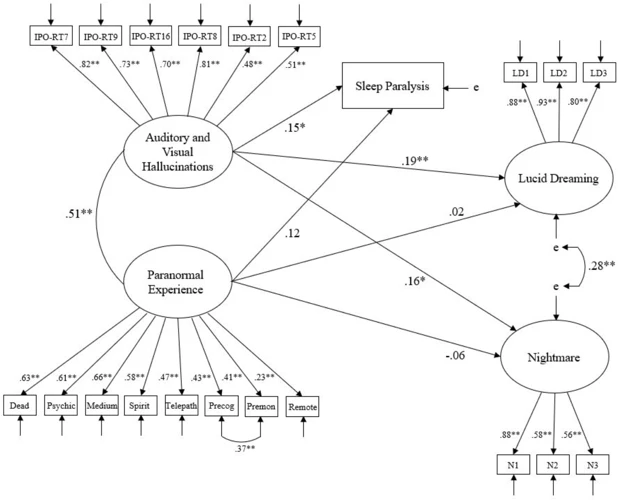Have you ever woken up from a vivid and terrifying dream, your heart pounding and your mind filled with fear? Nightmares are an unsettling part of the human experience, but did you know that there are different types? Regular nightmares can be distressing, but lucid nightmares take the experience to a whole new level. In this article, we will delve into the difference between regular nightmares and lucid nightmares, exploring their definitions, characteristics, causes, and effects. We will also discuss how to distinguish between the two and provide strategies for managing and overcoming them. So, buckle up and prepare to unravel the mysteries of these haunting dreams.
Regular Nightmares

Regular nightmares, also known as ordinary nightmares, can be a perplexing and unsettling phenomenon that occur during the rapid eye movement (REM) stage of sleep. These nightmares are characterized by intense and disturbing dream experiences, often involving themes of danger, terror, or helplessness. People who experience regular nightmares may wake up feeling overwhelmed with emotions such as fear, anxiety, or sadness. These nightmares can have various causes and triggers, which may include stress, trauma, medications, and sleep disorders. While regular nightmares can be distressing, they are a natural part of the dreaming process and are believed to serve as a way for the brain to process emotions and fears. Understanding the causes and effects of regular nightmares is essential in finding ways to manage and overcome them.
Definition and Characteristics
Regular nightmares, also known as ordinary nightmares, are a type of dream experience that is characterized by intense and distressing emotions, often involving feelings of fear, terror, or helplessness. These nightmares typically occur during the REM stage of sleep and can be vivid and realistic. The content of regular nightmares varies widely and can include themes of being chased, attacked, or facing imminent danger. The dreams may also involve disturbing or surreal imagery and situations that evoke feelings of unease and discomfort. During regular nightmares, individuals may experience physiological responses such as increased heart rate, sweating, and rapid breathing. Awakening from a regular nightmare can leave the person feeling shaken and anxious. It’s important to note that regular nightmares are a common aspect of the dreaming process and can occur in people of all ages.
Causes and Triggers
The causes and triggers of regular nightmares can vary from person to person. Understanding these factors can provide insight into why certain individuals experience these unsettling dreams. Here are some common causes and triggers associated with regular nightmares:
1. Stress and Anxiety: High levels of stress and anxiety can contribute to the occurrence of regular nightmares. When the mind is preoccupied with worrisome thoughts and emotions, it may manifest in dreams as terrifying or distressing experiences.
2. Trauma and PTSD: Individuals who have experienced traumatic events, such as accidents, violence, or abuse, may be more prone to regular nightmares. These dreams can act as a way for the subconscious mind to process and cope with the traumatic experiences.
3. Medications: Certain medications, such as antidepressants, antipsychotics, and beta-blockers, have been known to increase the likelihood of experiencing regular nightmares as a side effect. It is important to discuss any changes in dream patterns with a healthcare professional if medications are being taken.
4. Sleep Disorders: Conditions like sleep apnea, insomnia, or restless leg syndrome can disrupt the sleep cycle and increase the chances of experiencing regular nightmares. Addressing and managing these sleep disorders can help alleviate the frequency of these unsettling dreams.
5. Substance Abuse: The use of substances such as alcohol, drugs, or withdrawal from certain substances can disrupt the sleep cycle and lead to regular nightmares. Maintaining a healthy lifestyle and seeking support for substance abuse issues can help reduce the occurrence of these dreams.
6. Environmental Triggers: External factors such as loud noises, extreme temperatures, or sleeping in an unfamiliar environment can serve as triggers for regular nightmares. Creating a calm and comfortable sleep environment can minimize these external influences.
It is important to note that these are just some of the potential causes and triggers of regular nightmares. Each individual’s experience is unique, and it may require personal exploration and understanding to identify specific triggers. By recognizing and addressing these causes and triggers, individuals can take steps toward managing and reducing the frequency of regular nightmares.
Effects on Sleep and Mental Health
The effects of regular nightmares on both sleep and mental health can be significant. Sleep disruptions caused by the intense emotions and fear experienced during nightmares can lead to difficulties falling back asleep or even frequent awakenings throughout the night. This can result in a decreased quality of sleep, leading to daytime fatigue, irritability, and impaired cognitive function. The emotional toll of regular nightmares can have a detrimental impact on mental health. Constant exposure to distressing dream content may contribute to increased anxiety levels, heightened stress, and feelings of helplessness or vulnerability. Individuals who experience regular nightmares may also develop a fear of falling asleep, leading to sleep avoidance or insomnia. The cycle of poor sleep and negative emotions caused by regular nightmares can create a vicious cycle, further exacerbating mental health issues. Seeking professional help from a therapist or sleep specialist can be beneficial for managing and addressing the effects of regular nightmares on sleep and mental well-being.
Lucid Nightmares

Lucid nightmares, on the other hand, add another layer of complexity to the already enigmatic realm of dreams. In a state of lucid dreaming, individuals become aware that they are dreaming and may even have some degree of control over the dream’s narrative and events. However, when this awareness turns into a lucid nightmare, the experience can be extremely unsettling. Lucid nightmares involve a heightened sense of consciousness within the dream, where individuals are aware that they are trapped in a terrifying and often uncontrollable scenario. These nightmares can be triggered by various factors such as anxiety, trauma, or even certain lucid dreaming techniques. Understanding the unique features and causes of lucid nightmares is crucial in comprehending the intricate connection between consciousness and the dreaming mind.
Understanding Lucid Dreaming
Understanding lucid dreaming is a fascinating aspect of the dream world that allows individuals to become aware that they are dreaming while still in the dream itself. Lucid dreaming is a unique state where the dreamer possesses a level of consciousness and can actively engage and manipulate the dream environment. This phenomenon offers a sense of control and self-awareness within the dream space. During a lucid dream, individuals can make deliberate decisions, alter the dream narrative, and even explore their desires and fantasies. This state of awareness opens up endless possibilities for creativity, problem-solving, and self-exploration. Many people find lucid dreaming to be an exhilarating experience, as it provides an opportunity to fulfill impossible scenarios and overcome fears within the safety of a dream. While the exact mechanisms behind lucid dreaming are still under scientific scrutiny, researchers believe that it involves an interplay between the brain regions associated with self-consciousness, memory, and emotion. Understanding the intricacies of lucid dreaming is crucial in differentiating it from other types of dreaming, such as lucid nightmares. By grasping the concept of lucid dreaming, one can delve into the fascinating world of dream exploration and tap into their subconscious potential. (Reference: connection-lucid-dreaming-nightmares)
Lucid Nightmares: Definition and Features
Lucid nightmares, a subset of lucid dreaming, introduce a unique twist to the world of nightmares. In a lucid nightmare, the dreamer becomes aware that they are dreaming while experiencing a frightening or unsettling dream. This awareness grants them a certain level of control over the dream narrative, allowing them to manipulate the dream environment and their own actions. However, unlike regular nightmares, where the individual is often caught in a state of helplessness, lucid nightmares can quickly turn into a challenging and unnerving experience. Despite having some control, the dreamer finds themselves unable to completely escape the nightmarish elements of the dream. This can lead to a sense of powerlessness and frustration as they struggle to wake themselves up or alter the course of the dream. The intensity of the fear and anxiety experienced in lucid nightmares can be heightened due to the awareness of being in a dream state. These dreams may include themes such as being chased, attacked, or trapped in dangerous situations. While lucid nightmares can be distressing, some individuals actually seek them out as a way to confront their fears and explore the depths of their subconscious mind. Understanding the unique features of lucid nightmares is crucial in distinguishing them from regular nightmares and exploring their potential causes and triggers.
Possible Causes and Triggers
Possible causes and triggers of regular nightmares can vary from person to person and may be influenced by individual experiences and circumstances. Stress is a common factor that can contribute to the occurrence of regular nightmares. When we encounter stressors in our daily lives, such as work pressures, relationship difficulties, or financial worries, it can manifest in our dreams as unsettling and distressing scenarios. Traumatic experiences, both recent and past, may also play a role in causing regular nightmares. These traumas can range from accidents and physical injuries to emotional or psychological traumas, such as abuse or witnessing a distressing event. Additionally, certain medications, such as antidepressants, can interfere with the sleep cycle and lead to an increase in nightmares. Sleep disorders, including sleep apnea and insomnia, may also contribute to the occurrence of regular nightmares. It is important to note that the causes and triggers of regular nightmares can be complex and interconnected, and addressing them may require a holistic approach that considers both psychological and physiological factors. Seeking professional help from a therapist or sleep specialist can provide valuable insight and guidance in understanding and managing the causes and triggers of regular nightmares. For more information on the causes and triggers of lucid nightmares, you can refer to our article on the possible causes and triggers of lucid nightmares.
Distinguishing Between Regular and Lucid Nightmares

Distinguishing between regular nightmares and lucid nightmares can be a challenging task, as they share certain similarities in terms of their intense and frightening nature. However, there are key differences that set them apart. One way to differentiate between the two is by examining the level of awareness and control experienced during the dream. Regular nightmares typically involve a lack of awareness that one is dreaming, leaving the individual feeling helpless and at the mercy of the dream’s unfolding events. On the other hand, lucid nightmares occur when the dreamer is consciously aware that they are dreaming, often with a heightened sense of control over the dream’s narrative and outcome. This awareness can create a unique psychological experience, where the dreamer may actively try to influence and alter the course of the nightmare. Understanding these distinctions is crucial in recognizing and addressing the specific characteristics of each type of nightmare, paving the way for appropriate management strategies and potential growth in self-exploration.
Recognizing Key Differences in Sensations and Control
Recognizing key differences in sensations and control is crucial when distinguishing between regular nightmares and lucid nightmares. In regular nightmares, individuals often feel a sense of helplessness and lack control over the events that unfold. The dream scenarios may be vivid and intense, but individuals are usually unaware that they are dreaming and are unable to alter the dream’s course. The sensations experienced in regular nightmares can be overwhelming, with heightened emotions such as fear, anxiety, and panic. In contrast, lucid nightmares present a unique experience where individuals become aware that they are dreaming and can exert varying degrees of control over the dream content. This awareness allows individuals to actively participate in the dream, potentially altering the narrative, outcomes, or even waking themselves up. They may employ techniques like flying, changing settings, or confronting their fears head-on. However, despite having control over certain aspects, individuals may still face challenges in completely escaping the negative emotions and disturbing content of the dream. Recognizing these differences in sensations and control is essential in identifying whether the nightmare experience falls into the realm of regular or lucid nightmares. It grants individuals a deeper understanding of their dream experiences and can guide them towards effective management strategies.
Examining the Role of Awareness and Consciousness
Examining the role of awareness and consciousness in the context of nightmares is crucial to understanding the difference between regular nightmares and lucid nightmares. In regular nightmares, individuals typically have little to no awareness that they are dreaming and often feel powerless in the face of their terrifying experiences. The lack of conscious awareness can intensify the feelings of fear and helplessness during these dreams. However, in lucid nightmares, there is a significant shift in awareness and consciousness. In a lucid nightmare, individuals become aware that they are dreaming and may even have some control over the dream content or their actions within the dream. This heightened level of awareness can bring a new dimension to the nightmare experience, allowing individuals to navigate the dream with more agency and potentially influencing its outcome. While lucid nightmares can still be distressing, the ability to recognize and engage with the dream consciously opens up possibilities for personal growth and self-exploration. By exploring the depths of their own consciousness, individuals may gain insights, overcome fears, and even find creative solutions to real-life challenges. Understanding the role of awareness and consciousness is key to differentiating between regular nightmares and lucid nightmares and unlocking the potential benefits that lucidity can offer in the realm of dreams and personal development.
Managing Regular and Lucid Nightmares
Managing regular and lucid nightmares can be a crucial step in improving the quality of your sleep and overall mental well-being. One effective strategy is to keep a dream journal, where you can record and reflect on your dreams upon waking up. This practice can help you identify patterns, triggers, and emotions associated with your nightmares. Seeking relaxation techniques, such as deep breathing exercises or meditation, can also promote a sense of calmness before bed and potentially reduce the frequency and intensity of nightmares. Additionally, maintaining good sleep hygiene, such as sticking to a regular sleep schedule and creating a peaceful sleep environment, can contribute to better sleep quality. In some cases, professional help, such as therapy or counseling, may be necessary, especially if the nightmares are significantly impacting your daily life. Remember, managing nightmares takes time and patience, but with consistent effort, you can gain control and find relief from these unsettling dreams.
Utilizing Dream Journaling and Reflection
Utilizing Dream Journaling and Reflection can be a valuable tool in managing regular and lucid nightmares. Keeping a dream journal involves recording your dreams immediately upon waking up, capturing as much detail as possible. This practice helps in developing a greater awareness of your dream patterns and themes. Additionally, it allows you to spot common triggers or stressors that may be contributing to your nightmares. By reflecting on your dream journal entries, you can gain insights into your subconscious mind and better understand the underlying emotions and fears that manifest in your dreams.
When keeping a dream journal, it’s important to focus on the symbolism and emotions within your dreams rather than just the literal events. Look for recurring symbols or themes that appear in your nightmares, as they can offer valuable clues about your subconscious thoughts and feelings. Identifying patterns can help you uncover unresolved issues or anxieties that may be causing your nightmares.
Reflection is a key component of dream journaling. Take the time to review your dream journal regularly and analyze the patterns and symbolism. Try to connect your dreams to your waking life experiences and emotions. This reflection process can provide insights into the deeper meaning behind your nightmares and can aid in personal growth and self-exploration.
By utilizing dream journaling and reflection, you can develop a deeper understanding of your dreams and nightmares. This self-awareness can empower you to take control of your dreams and even transform negative experiences into opportunities for personal growth and healing. As you continue to explore your dreams through journaling and reflection, you may discover unexpected benefits, such as increased self-awareness, improved problem-solving skills, and a greater sense of inner peace. So grab a pen and notebook, and embark on the transformative journey of dream journaling and reflection. You never know what hidden wisdom awaits you within the realm of your dreams.
Exploring Relaxation Techniques and Sleep Hygiene
Exploring Relaxation Techniques and Sleep Hygiene:
To manage both regular and lucid nightmares, incorporating relaxation techniques and maintaining good sleep hygiene can be highly beneficial. Relaxation techniques such as deep breathing exercises, progressive muscle relaxation, and meditation can help reduce overall stress levels and promote a sense of calm before bedtime. By incorporating these practices into a nightly routine, individuals can create a more serene and peaceful environment for sleep.
In addition to relaxation techniques, maintaining good sleep hygiene is essential for a restful night’s sleep. This includes establishing a consistent sleep schedule, avoiding caffeine and stimulating activities before bed, and creating a comfortable sleep environment. Keeping the bedroom cool, dark, and quiet can promote a more conducive atmosphere for sleep, minimizing the occurrence of nightmares.
Additionally, practicing good sleep hygiene involves creating a bedtime routine that allows for winding down and relaxation. This may include activities such as reading a book, taking a warm bath, or engaging in light stretching exercises. These routines help signal to the body and mind that it is time to relax and prepare for sleep.
By incorporating relaxation techniques and maintaining good sleep hygiene, individuals may experience a reduction in the frequency and intensity of both regular and lucid nightmares. It is important to remember that these techniques might not eliminate nightmares entirely, but they can contribute to a more peaceful and restorative sleep experience. So, prioritize self-care, relaxation, and a healthy sleep routine to promote a sense of calm and peacefulness, both during the day and at night.
(Note: For more information on the potential benefits of lucid nightmares for growth and self-exploration, check out our article [insert link to /potential-benefits-lucid-nightmares-growth-self-exploration/] on this intriguing topic.)
Seeking Professional Help if Needed
Seeking professional help is crucial for individuals who find themselves struggling with regular or lucid nightmares. If nightmares significantly impact your quality of life, disrupt your sleep, or cause persistent distress, it may be beneficial to consult a healthcare professional. Psychologists, psychiatrists, or sleep specialists can provide specialized guidance and treatments to address nightmare disorders. Cognitive-behavioral therapy for nightmares (CBT-N) is a commonly recommended approach. This therapy focuses on identifying and modifying negative thought patterns and beliefs associated with nightmares. It may involve techniques such as exposure therapy, where individuals gradually confront and process their fears within a safe environment. Additionally, medication might be considered in some cases, particularly if nightmares are linked to an underlying mental health condition. The key is to consult a qualified professional who can assess your specific situation and recommend the most appropriate course of action. Remember, seeking help is a sign of strength and can significantly improve your well-being and quality of sleep.
Conclusion
In conclusion, exploring the difference between regular nightmares and lucid nightmares sheds light on the unique aspects of these unsettling dream experiences. Regular nightmares, with their intense and disturbing themes, can leave individuals feeling scared and anxious upon waking. On the other hand, lucid nightmares take the fear to a new level by incorporating awareness and control within the dream state. While regular nightmares are a natural part of the dreaming process and serve as a means for emotional processing, lucid nightmares provide an opportunity for self-awareness and exploration. Recognizing the key differences between regular and lucid nightmares, such as sensations and control, as well as the role of awareness and consciousness, can assist individuals in understanding their dream experiences better. By utilizing techniques such as dream journaling, relaxation techniques, and seeking professional help if needed, individuals can effectively manage and overcome the distress caused by both regular and lucid nightmares. Remember, nightmares may be unsettling, but they also offer a gateway to better understanding our emotions and fears within the realm of our dreams.
Frequently Asked Questions
What are some common themes in regular nightmares?
In regular nightmares, common themes often revolve around situations of danger, fear, or helplessness. These may include being chased, falling, being trapped, or experiencing natural disasters.
Can regular nightmares be influenced by real-life experiences?
Yes, regular nightmares can be influenced by real-life experiences, including stressful situations, traumatic events, or even watching frightening movies or reading scary stories before bed.
Why do regular nightmares occur during REM sleep?
Regular nightmares occur during REM (rapid eye movement) sleep because this is the stage of sleep when dreaming is most vivid and intense. During REM sleep, the brain is highly active and can create vivid dream scenarios.
Are regular nightmares harmful to mental health?
Regular nightmares can negatively impact mental health by causing distress, anxiety, and disrupted sleep patterns. Chronic nightmares may contribute to the development of sleep disorders and potentially exacerbate existing mental health conditions.
Can regular nightmares be prevented?
While it is not always possible to prevent regular nightmares entirely, certain strategies may help decrease their frequency. These include practicing relaxation techniques before bed, creating a calming bedtime routine, and managing stress levels in daily life.
What is the role of regular nightmares in emotional processing?
Regular nightmares are believed to play a role in emotional processing. They can provide an outlet for the mind to process and release intense emotions, fears, and anxieties that may be suppressed during waking hours.
Can regular nightmares have positive effects?
While regular nightmares mainly evoke negative emotions, they can sometimes have positive effects. Regular nightmares can be seen as opportunities for personal growth, self-reflection, and gaining insights into one’s deeper fears and anxieties.
How do regular nightmares differ from night terrors?
Regular nightmares and night terrors are two distinct phenomena. Nightmares occur during REM sleep and are often vividly recalled, while night terrors happen during non-REM sleep and are characterized by sudden awakenings accompanied by intense fear or panic, usually with little or no memory of the event.
Are regular nightmares more common in certain age groups?
Regular nightmares can occur at any age, but they are particularly common in children. Research suggests that nightmares are most prevalent during childhood and tend to decrease in frequency as individuals grow older.
When should professional help be sought for regular nightmares?
If regular nightmares significantly interfere with daily life, cause severe distress, or contribute to other sleep disorders or mental health issues, it may be advisable to seek professional help from a qualified healthcare provider or therapist for appropriate evaluation and treatment.








